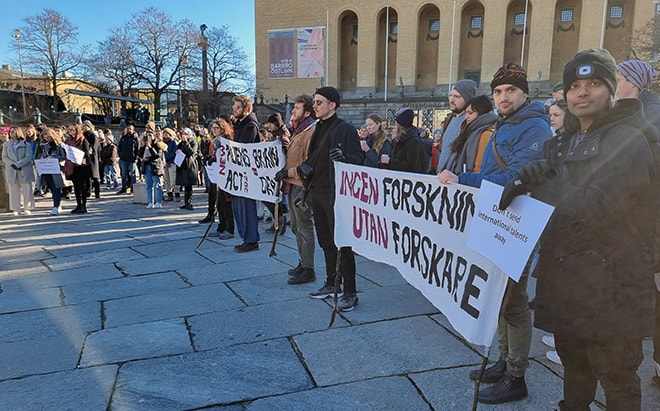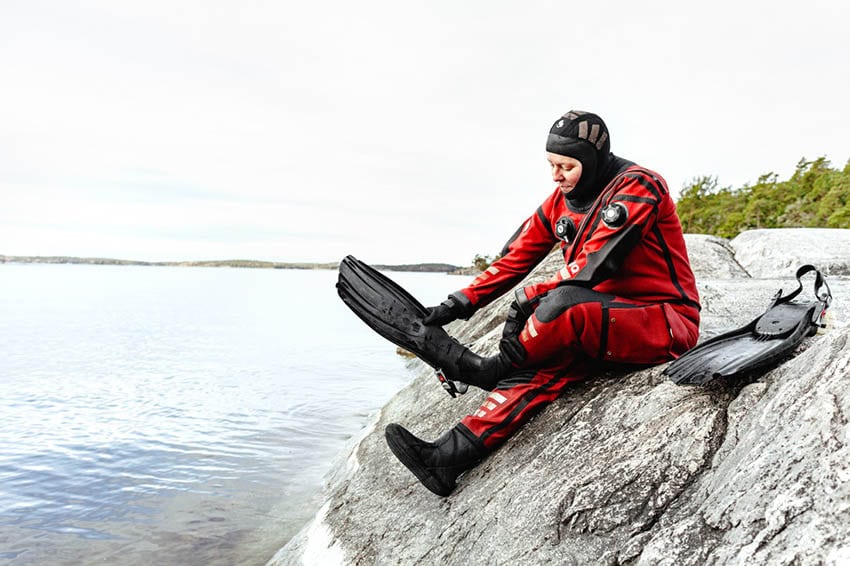It is a sunny late-winter’s day, with temperatures a degree or two above zero. The demonstrators gather in a semicircle at Carl Mille’s Poseidon Statue on Götaplatsen. It is a little chilly in the shadow of the statue, so the participants gradually move into the sunshine.
The queue for coffee at the organisers’ table is long, the atmosphere is friendly, people take the opportunity to socialise and in the breaks between speakers the noise from the participants increases.
“The change in the Aliens Act last summer and then the Swedish Migration Agency’s decision that 18 months of permanent employment from the date the application is processed is required has created extreme uncertainty for doctoral candidates from countries outside the EU,” says Elin Malmgren to Universitetsläraren.
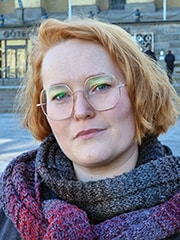
She is Chair of the Doctoral Candidate Section at Chalmers Student Union and one of the speakers at the demonstration.
“In the short term, we want to see a change in the legislation in order to provide stability for foreign doctoral candidates. And we want to show clearly that we do not want our highly educated colleagues to disappear. We are here and we support each other.”
”We will end up impoverishing society”
The opening speaker and host of the event is Veronica Ideböhn, a doctoral candidate studying atomic and molecular physics at the University of Gothenburg. She is Chair of the doctoral candidate committee at the University of Gothenburg, GUDK, which has organised the demonstration together with Chalmers Student Union and Chalmers Student Union Doctoral Candidate Section.
“The change in the law affects many colleagues personally,” she tells Universitetsläraren.
“They have come here in the hope of being able to stay. But we also see that with a tougher immigration law we will not attract as many young researchers. Then we will end up impoverishing the research community, we will have poorer research and it will affect the whole of society. In the short term, it impacts us Swedish doctoral candidates and it will affect the rest of the higher education sector, so it’s absolutely not just the foreign doctoral candidates who are affected.”
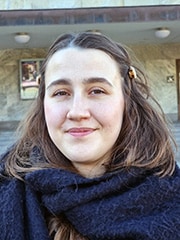
”More difficult if I stay in higher education”
One of the speakers directly affected is Mareddy Reddy from India, a doctoral candidate studying chemistry at Chalmers, where he is developing the next generation of fuel cells. He tells Universitetsläraren that he expects to complete his doctorate in a year.
“After completing my doctorate, I can either work in industry or in higher education. If I go into industry and get a job, I can get a permanent residence permit and everything will be fine. But I want to continue with my research as a postdoc. The problem there is that I won’t be able to get employment with a contract for more than two years. But the Swedish Migration Agency requires 18 months of employment from the day they finish processing your application, and that can take up to nine months. So for me, it’s much more difficult to get a permanent residence permit if I continue working in higher education.”
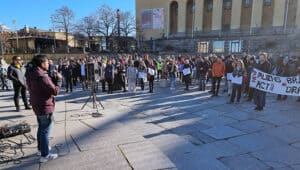
And the change in the law increases the pressure.
“Higher education is already incredibly stressful, because you have short-term employment contracts, you have to write applications and you never know how tomorrow will look. And now you get extra layer of stress due to the Aliens Act, which creates extra problems,” says Reddy.
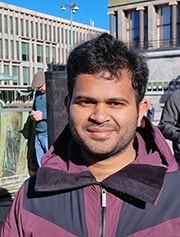
“My understanding is that Sweden has long been engaged in the international exchange of ideas, people and skills. But this new Aliens Act makes the country unattractive to doctoral candidates and postdocs from countries outside Europe. If they have the possibility to choose, they may prefer another country, such as the Netherlands.”
How does it feel for you personally?
“It’s stressful,” says Reddy, “but I try not to think too much about it. What happens happens and I can’t do much about it.”
Doctor waited for over a year
Among those taking part in the demonstration is Azar Rezapour from Iran, a doctor and doctoral candidate studying cancer immunology at the University of Gothenburg.
“The last time I applied for an extension of my residence permit, it took 13 months. I’m not kidding, it took a year and a month, and I was just waiting! That is why we want permanent residence permits when we have completed our doctorates.”
The change in the Aliens Act has ruined her future plans.
“I’m a qualified doctor. Sweden needs doctors, but since I come from a non-EU country, I have to get a Swedish licence to practice medicine, and that process is very long. According to the National Board of Health and Welfare, it takes between two and four years.”
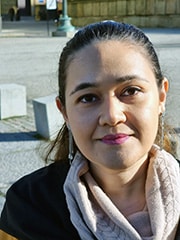
“I’d hoped that after completing my doctorate I’d be able to devote time to getting a Swedish licence,” says Rezapour, “but now that I can’t get a permanent residence permit, those plans are no more. After getting my doctorate, I have to get a job very quickly instead, either in higher education or in industry. And none of them will give me long-term employment.”
After just under an hour, Veronica Ideböhn from GUDK brings the demonstration to a close and announces that a demonstration in support of Ukraine has been planned for later that afternoon on Gustav Adolfs torg.
